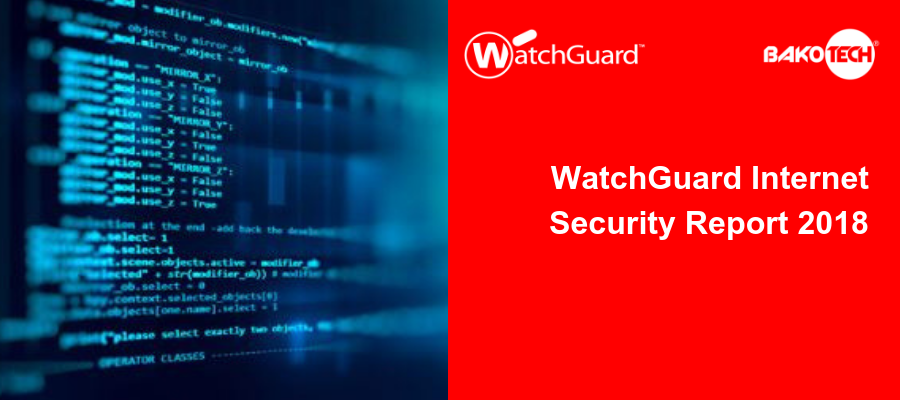News

WatchGuard’s Q1 2018 Internet Security Report reveals a rise in crypto-miner attacks and targeted malware campaigns
17 Sep 2018

WatchGuard® Technologies, a leader in advanced network security solutions, published its latest Internet Security Report. Threat intelligence from Q1 2018 revealed that 98.8 percent of seemingly common Linux/Downloader malware variants were actually designed to deliver a popular Linux-based cryptocurrency miner.
WatchGuard’s Internet Security Report offers in-depth insights on the top cyber threats each quarter, along with defense recommendations SMBs can use to protect themselves. The findings are based on data from tens of thousands of active Firebox UTM appliances around the world. The top takeaways from the Q1 2018 report include:
- Cryptocurrency miners are on the rise.
Several cryptocurrency miners appeared for the first time in WatchGuard’s list of the top 25 malware variants. Firebox appliances have a rule called Linux/Downloader, which catches a variety of Linux “dropper” or “downloader” programs that download and run malware payloads. Usually these droppers download a wide range of malware, but in Q1 2018, 98.8 percent of Linux/Downloader instances were trying to download the same popular Linux-based crypto miner. Evidence from Q2 so far indicates that crypto-mining malware will stay on WatchGuard’s top 25 list and may even crack the top 10 by the end of the quarter.
- The Ramnit trojan makes a comeback in Italy.
The only malware sample on WatchGuard’s top 10 list that hadn’t appeared in a past report was Ramnit, a trojan that first emerged in 2010 and had a brief resurgence in 2016. Nearly all (98.9 percent) of WatchGuard’s Ramnit detections came from Italy, indicating a targeted attack campaign. Since past versions of Ramnit have targeted banking credentials, WatchGuard advises Italians to take extra precautions with their banking information and enable multi-factor authentication for any financial accounts.
- For the first time, APAC reports the highest malware volume.
In past reports, APAC has trailed EMEA and AMER in the number of eported malware hits by a wide margin. In Q1 2018, APAC received the most malware overall. The vast majority of these attacks were Windows-based malware and 98 percent were aimed at India and Singapore.
- Nearly half of all malware eludes basic antivirus (AV) solutions.
WatchGuard UTM appliances block malware using both legacy signature-based detection techniques and a modern, proactive behavioral detection solution - APT Blocker. When APT Blocker catches a malware variant, it means the legacy AV signatures missed it. This zero day malware (a term for malware that is able to evade traditional signature-based AV) accounted for 46 percent of all malware in Q1. This level of zero day malware suggests that criminals are continuing to use obfuscation techniques to beat traditional AV services, emphasizing the importance of behavior-based defenses.
- Mimikatz targets the US, skips Asia Pacific.
The Mimikatz Windows credential-stealing malware reappeared on WatchGuard’s top 10 malware list after several quarters of absence. Two thirds of the detection of this malware was in the United States and under 0.1 percent of detections were in APAC, possibly due to the complexity of double-byte characters in countries like Japan that use a symbol-based language for passwords.
The complete Internet Security Report features a detailed breakdown of the record-breaking GitHub 1.35 Tbps DDoS attack, as well as analysis of the quarter’s top malware and network attacks, and key defense tactics for SMBs.
This quarter’s conclusions are based on anonymized Firebox Feed data from nearly 40,000 active WatchGuard UTM appliances worldwide, which blocked more than 23 million malware variants (628 per device) and over 10 million network attacks (278 per device) in Q1 2018.
For more information, see the full report below. If you have any questions about AuthPoint or other WatchGuard solutions, please, write us at watchguard@bakotech.com.

 Հայաստանի Հանրապետություն
Հայաստանի Հանրապետություն Azərbaycan
Azərbaycan Рэспубліка Беларусь
Рэспубліка Беларусь Република България
Република България  Bosna i Hercegovina
Bosna i Hercegovina  Česká republika
Česká republika საქართველოს
საქართველოს Republika Hrvatska
Republika Hrvatska  Kosovo
Kosovo  Қазақстан
Қазақстан  Кыргыз Республикасы
Кыргыз Республикасы  Latvija
Latvija Lietuva
Lietuva Magyarország
Magyarország  Moldova
Moldova  Република Македонија
Република Македонија  România
România  Rzeczpospolita Polska
Rzeczpospolita Polska Република Србија
Република Србија  Российская Федерация
Российская Федерация  Republika Slovenija
Republika Slovenija  Slovensko
Slovensko Тоҷикистон
Тоҷикистон Türkmenistan
Türkmenistan Україна
Україна
